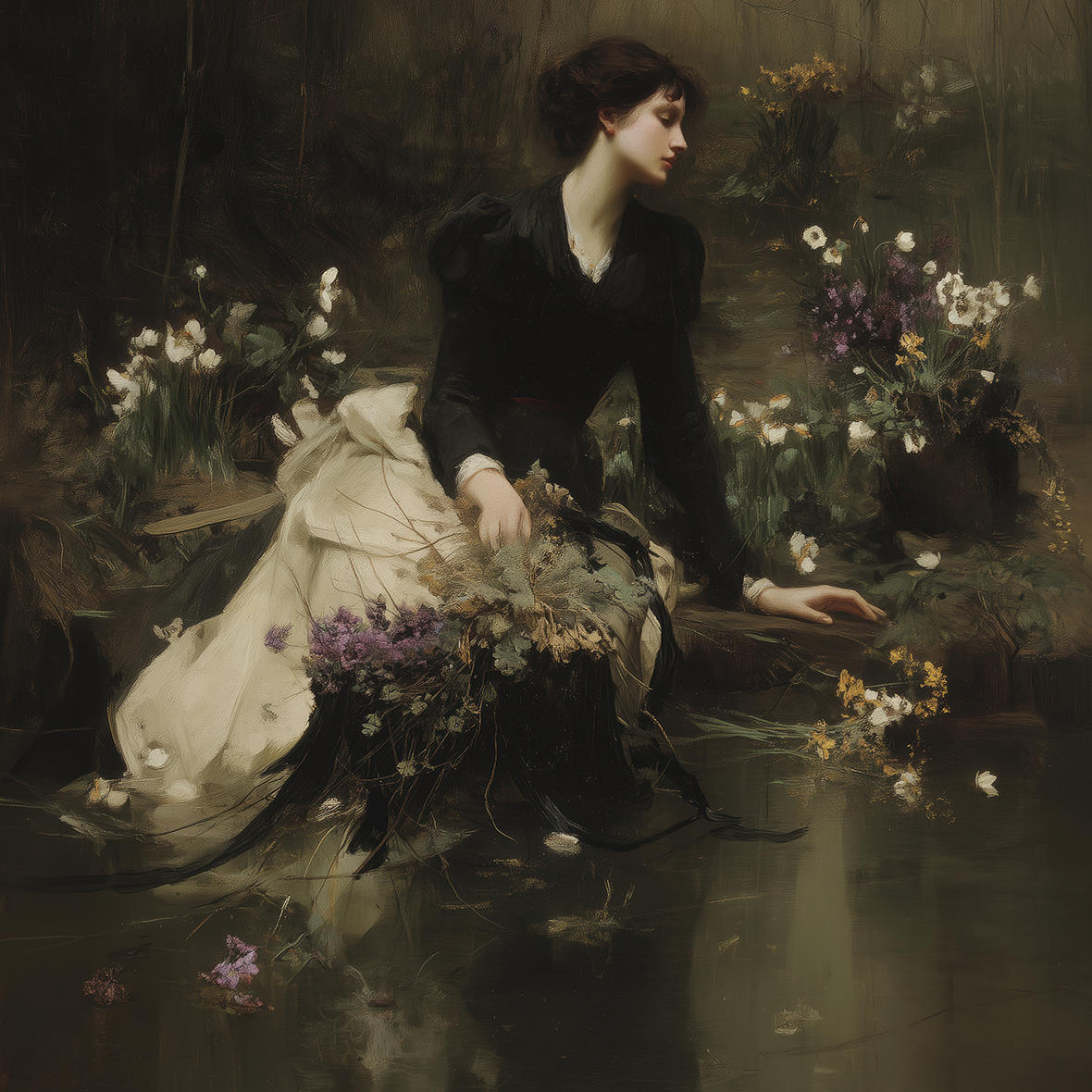Sister's Spring
Some love runs so deep it leaves a voice behind. In the hush of an unseen glen, where mist lingers, and wild violets bloom out of season, Sister’s Spring flows eternal. The water speaks in quiet ways—to those who grieve, to those who remember. It carries the story of sacrifice, of a bond unbroken by death, of one sister who gave everything so the other could sing. This is not a place for fear. It is a place to be held by the land, gently, as memory blossoms beneath your skin.
Scent Profile
Top: Peach, Orange Peel
Heart: Rose, Marine, Sweet Pea
Base: Teakwood, Mango, Musk
Scent Profile
Top: Peach, Orange Peel
Heart: Rose, Marine, Sweet Pea
Base: Teakwood, Mango, Musk

Sister's Spring
She gave her breath for another. Now the spring speaks her name.
In a quiet glen beyond the reach of town roads, where the hills roll low and the trees hang heavy with mist, there’s a spring that bubbles cold and clear from the roots of a moss-draped rock. It’s easy to miss if you’re not looking. No sign marks it. No path leads to it directly. But those who know, know. They call it Sister’s Spring. Not for its twin branches or the way it splits and rejoins itself like a ribbon—no. It was named for the girl who died there, and for the one who lived.
The story is old, whispered more than told. It begins with two sisters—Mara and Elin. One golden as dawn, the other dark-haired and quiet as dusk. Close as clasped hands, always together in the meadows, on the trails, beside the creek. Mara, the elder, was known for her laughter—bright, reckless, contagious. Elin, the younger, for her songs—soft, strange melodies that made the hair on the back of your neck stand just so. They were born to a homestead that stood not far from the spring, raised on wild strawberries, wood smoke, and the lullabies of their mother.
On the day it happened, the air had just begun to turn—the kind of late spring afternoon that promises warmth but keeps the chill beneath. The sisters had gone to the spring to gather water and crown each other in violets. It was a ritual of theirs—an offering to the season, a celebration of everything still in bloom.
No one saw what happened, only heard the screaming afterward. Elin had slipped. Caught her foot in the moss, tumbled into the deep heart of the spring. It’s not wide, but it’s older than it looks—fed by a hidden cave below, cold and deceptively deep. And Mara—without hesitation, without thought—leapt in after her.
Some say Elin was pulled free. Others say she was pushed up by unseen hands. But Mara never rose. The spring closed still above her like a mirror unbroken. When they found her, she was caught in the roots beneath the stone, her hands open, her eyes still looking upward.
They buried her on the hill above the water’s edge, under a dogwood tree that still blooms like a sigh each April. Elin, numb with grief, didn’t speak for weeks. When her voice returned, it came slowly, as if borrowed. Thin and echoing, like it had passed through water to reach her.
She returned to the spring daily. Sat at its edge with her feet in the current, her hand trailing the surface. At first she said nothing. Then, one day, she came home whispering the old songs Mara used to hum. Later, she began dreaming of things that hadn't yet happened. People from town came to her for news, for comfort, for the strange peace she seemed to carry. They said she could calm a fever with a touch. That animals followed her. That grief softened in her presence.
Elin never claimed to be a healer. “I only listen,” she would say. But when pressed—about the songs, the visions, the voice she sometimes answered when no one was there—she would look toward the hills and say, “It’s the spring. It remembers.”
So the place was named Sister’s Spring. Not in blame. Not in sorrow. But in reverence. In memory of love that crossed the threshold. Of sacrifice that left something behind.
Over the years, others began to find their way there, drawn by whispers and winding paths. A mother grieving a stillborn child said she found peace at the water’s edge, the babble of the spring like a lullaby. A soldier, broken by war, sat beneath the dogwood for hours and left with tears drying on his cheeks and a sprig of violet tucked behind his ear. The spring does not speak loudly, but those who truly listen say they feel something—an embrace, a softening, a hush in the chest that feels like being known.
Elin never married. She stayed in the hills, tending her family’s land. Grew herbs. Dried them in the sun. Walked barefoot until her hair turned silver and her back bent low. People came to her for tinctures, for wisdom, for dreams interpreted. Some nights, lamplight flickered near the spring, and her silhouette moved through the trees like a shadow cast by memory.
When Elin died, decades later, they buried her beside Mara under the dogwood. Two stones now stand side by side, weathered and simple. No dates. Only names. But the flowers bloom there longer than anywhere else. Even through drought. Even through frost. Locals say it’s the sisters watching. That love like that doesn’t vanish. It roots deep.
The spring still flows—clear, cold, and oddly quiet. Children dip their fingers in it and dare each other to whisper wishes into its heart. Lovers leave tokens—a ribbon, a ring, a vow said into the water. Hikers pass it with reverence, pressing palms to the stone, closing their eyes. And sometimes, when the wind comes down from the hill just right, it carries a hum through the trees—a girl’s voice, maybe two—singing a song too old to know, but too familiar to forget.
There’s an old woman now who keeps a diary of visits to the spring. She collects stories from strangers who find their way there—whether by accident or need. A girl who left her grief behind with a handful of wild violets. A man who woke from a dream with the name “Mara” on his lips, though he never knew the tale. A boy who claimed the spring whispered his mother’s voice, though she’d been gone for years. The woman never judges. She just writes it all down. She believes the spring remembers. And that remembering is its offering.
Local legend says if you leave something behind at Sister’s Spring—a word, a name, a question—the water will carry it. Not to the dead, exactly, but to the place where they might still hear. More than one mourner has returned to find their offering gone, replaced with something new: a smooth stone, a white feather, a bloom from no local tree.
No one guards the spring, and yet it is protected. When vandals tried once to carve their names into the dogwood, the bark healed over by morning. When a group of campers tried to pitch tents too near, they awoke covered in frost, though it was mid-June. They did not return.
It is not a place for spectacle. It is a place for reverence.
Some say water has memory. At Sister’s Spring, it has a voice. A soft one. Made of currents and wind, of leaves touching water, of girls who once crowned each other in violets and shared the same breath. A voice that remembers, that bears witness. That sings.It is not a ghost story, though there are shadows. It is not a tragedy, though there was loss. It is a love story, through and through—between siblings, between land and water, between past and presence. A story of devotion deep enough to bloom.
So if you find yourself there—on a day when the mist hangs low and the air feels like memory—sit awhile. Let the hush settle over you. Let the water pass through your fingers. Leave a question. Or a flower. Or just your silence.
And listen.
You might hear what Mara left behind: not sorrow, but presence. Not death, but a voice that waits in the water, speaking the names it refuses to forget.
In a quiet glen beyond the reach of town roads, where the hills roll low and the trees hang heavy with mist, there’s a spring that bubbles cold and clear from the roots of a moss-draped rock. It’s easy to miss if you’re not looking. No sign marks it. No path leads to it directly. But those who know, know. They call it Sister’s Spring. Not for its twin branches or the way it splits and rejoins itself like a ribbon—no. It was named for the girl who died there, and for the one who lived.
The story is old, whispered more than told. It begins with two sisters—Mara and Elin. One golden as dawn, the other dark-haired and quiet as dusk. Close as clasped hands, always together in the meadows, on the trails, beside the creek. Mara, the elder, was known for her laughter—bright, reckless, contagious. Elin, the younger, for her songs—soft, strange melodies that made the hair on the back of your neck stand just so. They were born to a homestead that stood not far from the spring, raised on wild strawberries, wood smoke, and the lullabies of their mother.
On the day it happened, the air had just begun to turn—the kind of late spring afternoon that promises warmth but keeps the chill beneath. The sisters had gone to the spring to gather water and crown each other in violets. It was a ritual of theirs—an offering to the season, a celebration of everything still in bloom.
No one saw what happened, only heard the screaming afterward. Elin had slipped. Caught her foot in the moss, tumbled into the deep heart of the spring. It’s not wide, but it’s older than it looks—fed by a hidden cave below, cold and deceptively deep. And Mara—without hesitation, without thought—leapt in after her.
Some say Elin was pulled free. Others say she was pushed up by unseen hands. But Mara never rose. The spring closed still above her like a mirror unbroken. When they found her, she was caught in the roots beneath the stone, her hands open, her eyes still looking upward.
They buried her on the hill above the water’s edge, under a dogwood tree that still blooms like a sigh each April. Elin, numb with grief, didn’t speak for weeks. When her voice returned, it came slowly, as if borrowed. Thin and echoing, like it had passed through water to reach her.
She returned to the spring daily. Sat at its edge with her feet in the current, her hand trailing the surface. At first she said nothing. Then, one day, she came home whispering the old songs Mara used to hum. Later, she began dreaming of things that hadn't yet happened. People from town came to her for news, for comfort, for the strange peace she seemed to carry. They said she could calm a fever with a touch. That animals followed her. That grief softened in her presence.
Elin never claimed to be a healer. “I only listen,” she would say. But when pressed—about the songs, the visions, the voice she sometimes answered when no one was there—she would look toward the hills and say, “It’s the spring. It remembers.”
So the place was named Sister’s Spring. Not in blame. Not in sorrow. But in reverence. In memory of love that crossed the threshold. Of sacrifice that left something behind.
Over the years, others began to find their way there, drawn by whispers and winding paths. A mother grieving a stillborn child said she found peace at the water’s edge, the babble of the spring like a lullaby. A soldier, broken by war, sat beneath the dogwood for hours and left with tears drying on his cheeks and a sprig of violet tucked behind his ear. The spring does not speak loudly, but those who truly listen say they feel something—an embrace, a softening, a hush in the chest that feels like being known.
Elin never married. She stayed in the hills, tending her family’s land. Grew herbs. Dried them in the sun. Walked barefoot until her hair turned silver and her back bent low. People came to her for tinctures, for wisdom, for dreams interpreted. Some nights, lamplight flickered near the spring, and her silhouette moved through the trees like a shadow cast by memory.
When Elin died, decades later, they buried her beside Mara under the dogwood. Two stones now stand side by side, weathered and simple. No dates. Only names. But the flowers bloom there longer than anywhere else. Even through drought. Even through frost. Locals say it’s the sisters watching. That love like that doesn’t vanish. It roots deep.
The spring still flows—clear, cold, and oddly quiet. Children dip their fingers in it and dare each other to whisper wishes into its heart. Lovers leave tokens—a ribbon, a ring, a vow said into the water. Hikers pass it with reverence, pressing palms to the stone, closing their eyes. And sometimes, when the wind comes down from the hill just right, it carries a hum through the trees—a girl’s voice, maybe two—singing a song too old to know, but too familiar to forget.
There’s an old woman now who keeps a diary of visits to the spring. She collects stories from strangers who find their way there—whether by accident or need. A girl who left her grief behind with a handful of wild violets. A man who woke from a dream with the name “Mara” on his lips, though he never knew the tale. A boy who claimed the spring whispered his mother’s voice, though she’d been gone for years. The woman never judges. She just writes it all down. She believes the spring remembers. And that remembering is its offering.
Local legend says if you leave something behind at Sister’s Spring—a word, a name, a question—the water will carry it. Not to the dead, exactly, but to the place where they might still hear. More than one mourner has returned to find their offering gone, replaced with something new: a smooth stone, a white feather, a bloom from no local tree.
No one guards the spring, and yet it is protected. When vandals tried once to carve their names into the dogwood, the bark healed over by morning. When a group of campers tried to pitch tents too near, they awoke covered in frost, though it was mid-June. They did not return.
It is not a place for spectacle. It is a place for reverence.
Some say water has memory. At Sister’s Spring, it has a voice. A soft one. Made of currents and wind, of leaves touching water, of girls who once crowned each other in violets and shared the same breath. A voice that remembers, that bears witness. That sings.It is not a ghost story, though there are shadows. It is not a tragedy, though there was loss. It is a love story, through and through—between siblings, between land and water, between past and presence. A story of devotion deep enough to bloom.
So if you find yourself there—on a day when the mist hangs low and the air feels like memory—sit awhile. Let the hush settle over you. Let the water pass through your fingers. Leave a question. Or a flower. Or just your silence.
And listen.
You might hear what Mara left behind: not sorrow, but presence. Not death, but a voice that waits in the water, speaking the names it refuses to forget.


-Photoroom.jpg)

